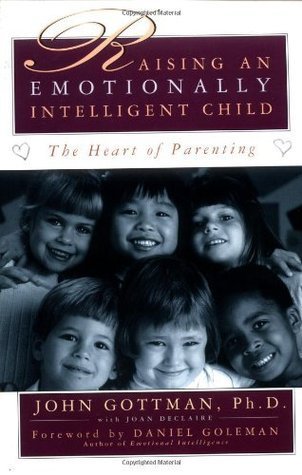
Raising An Emotionally Intelligent Child
Daniel Goleman, John M. Gottman
About the Author

Daniel Goleman
Questions & Answers
"Emotion Coaching" is crucial for raising emotionally intelligent children as it teaches them to understand, manage, and express their emotions effectively. It differs from traditional parenting styles in several key ways:
-
Emphasis on Emotions: Unlike traditional parenting that often focuses on behavior, Emotion Coaching acknowledges and validates children's emotions, helping them develop emotional intelligence.
-
Empathy and Connection: Emotion Coaching involves empathizing with children's feelings, fostering a strong emotional bond and sense of security.
-
Problem-Solving: It encourages children to express their emotions and work together with parents to find solutions, fostering critical thinking and resilience.
-
Avoidance of Dismissal and Disapproval: Unlike dismissive or disapproving parents, Emotion Coaching parents do not trivialize or criticize children's emotions, allowing them to learn from their feelings.
-
Continuous Learning: Emotion Coaching is a dynamic process that evolves with the child, teaching them to self-soothe and develop emotional regulation skills throughout their lives.
Emotion Coaching significantly benefits a child's emotional health, academic performance, and social relationships. It enhances emotional intelligence by teaching children to regulate their emotions, soothe themselves, and understand others. This leads to fewer negative feelings and more positive ones, better physical health, and fewer behavior problems. Academically, children of Emotion-Coaching parents score higher and have fewer issues with peers. Socially, they develop better communication skills, form stronger friendships, and are more resilient in the face of challenges. This approach fosters a supportive environment that prepares children for life's risks and challenges.
The five key steps of Emotion Coaching are:
- Awareness: Recognize and acknowledge the child's emotions.
- Opportunity: View emotions as a chance for intimacy and teaching.
- Empathetic Listening: Validate the child's feelings and listen without judgment.
- Labeling Emotions: Help the child express and understand their emotions through words.
- Problem-Solving: Set limits and guide the child in finding solutions.
These steps contribute to building a strong emotional bond by:
- Empowering the Child: Giving them a voice and helping them understand and manage their emotions.
- Enhancing Communication: Encouraging open dialogue and mutual respect.
- Fostering Trust: Demonstrating empathy and support, making the child feel safe and understood.
- Building Self-Esteem: Helping the child develop a positive self-image and confidence.
- Strengthening the Parent-Child Relationship: Creating a collaborative and loving environment that promotes emotional intelligence and resilience.
Parents can manage their emotional responses and conflicts to shield children from marital discord and divorce's negative impacts by practicing Emotion Coaching. This involves:
-
Empathetic Listening: Tuning into children's emotions and validating their feelings without judgment, helping them understand that their emotions are valid.
-
Setting Limits with Love: Establishing clear rules and consequences while maintaining a connection, ensuring children feel loved and understood.
-
Problem-Solving Together: Encouraging children to express their thoughts and feelings, then collaboratively finding solutions, fostering emotional intelligence.
-
Avoiding the "Four Horsemen": Refraining from criticism, contempt, defensiveness, and stonewalling in interactions with their partner, as these behaviors can harm children.
-
Maintaining Emotional Availability: Staying engaged in children's lives, providing emotional support, and being a stable presence during turbulent times.
By adopting these strategies, parents can create a nurturing environment that supports children's emotional well-being, even amidst marital challenges.
In Emotion Coaching, the father plays a crucial role in fostering emotional intelligence in children. He is not just a secondary figure but can significantly impact a child's emotional development. Men can develop a stronger emotional connection with their children by:
-
Emotional Awareness: Men should recognize and acknowledge their own emotions and those of their children. This involves being open to expressing feelings and understanding that emotions are a normal part of life.
-
Active Engagement: Men should actively participate in their children's lives, including daily care and play. This helps build trust and a sense of security.
-
Empathy and Validation: Showing empathy and validating a child's feelings helps children learn to regulate their emotions. Men should avoid dismissive or critical attitudes and instead offer understanding and support.
-
Positive Role Modeling: Men should model healthy emotional expression and conflict resolution. This includes managing anger constructively and communicating openly.
-
Quality Time: Spending meaningful time with children, engaging in activities that both enjoy, strengthens the bond and allows for emotional growth.
By embracing these practices, fathers can contribute significantly to their children's emotional intelligence and overall well-being.